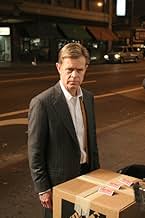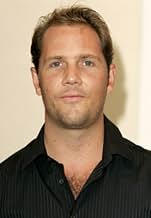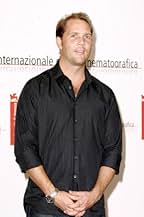A fortune-teller's teasing rumination sends Edmond Burke lurching into New York City's hellish underworld.A fortune-teller's teasing rumination sends Edmond Burke lurching into New York City's hellish underworld.A fortune-teller's teasing rumination sends Edmond Burke lurching into New York City's hellish underworld.
- Awards
- 3 wins & 2 nominations
Storyline
Did you know
- TriviaLionel Mark Smith, who plays the pimp in this movie, played a pimp (as well as a shill) in production of the original play back in 1982.
- GoofsThe shots of the basketball game in the bar keep showing the same segment even after many minutes pass during the conversation. You see the same scramble for the ball and the same drive to the basket at least twice.
- Alternate versionsThere are three versions available, with two different runtimes. These are: "1h 22m (82 min)", U.S. theatrical release, "1h 16m( 76 min) (Brazil)" and "1h 22m(82 min) (Mar del Plata) (Argentina)".
- ConnectionsFeatured in Every Fear Hides a Wish: The Edmond Diary (2006)
Featured review
At first glance, horror meister Stuart Gordon would not seem the obvious choice to direct an emotional psycho-drama cinematic rendering of a David Mamet play, yet with Edmond, he displays a deft touch for the material and allows the actors to carry the day.
Originally penned as a stage play, Edmond tells the story of namesake Edmond Burke (William H. Macy), a mundane white collar worker who has spent his entire life being a faceless cog in the big industrial machine. The rescheduling of a business appointment to 1:15 (a number which re-occurs in the film) propels him to idle away his time with a visit to a tarot reader who tells him he's not where he's supposed to be. From there he begins a slow spiral into depravity and insanity that begins with telling his wife he's leaving her and progresses to an outback-like dreamwalk into New York City's seedy underbelly of bars pimps and prostitutes.
Written in the wake of a divorce, Mamet infuses the script with racial discourse and epithets that are stunning in their caustic vulgarity as Edmond pours out years of pent up hatred on one of his muggers revealing a window into his shallow soul that only becomes more intensely evident as the movie reaches its conclusion.
In the scene where Edmond tells his wife their marriage is over, he explains to her that she hasn't satisfied him spiritually or emotionally for quite some time. Yet, after watching his progression trough the course of the story, it becomes clear that spiritually he has no soul, and emotionally he's a shallow but volatile cauldron of disjointed thoughts.
The film is a tour-de-force for Macy, who is in every scene and morphs from a character of Caspar Milquetoast proportions to unhinged bigoted psychopath and back again by the movie's end. Along the way he's complimented by solid performances from Joe Mantegna, Julia Stiles, Mena Suvari and Bokeem Woodbine. As if in a wink and nudge to his own work, Gordon even manages to insinuate longtime stalwart Jeffrey Combs into a small but telling scene during Edmond's descent into insanity.
By the time Edmond arrives at the end of that journey, however; at that place where he ought to be; I couldn't help but think he had merely wasted his life catching up to where his soul was long ago.
Originally penned as a stage play, Edmond tells the story of namesake Edmond Burke (William H. Macy), a mundane white collar worker who has spent his entire life being a faceless cog in the big industrial machine. The rescheduling of a business appointment to 1:15 (a number which re-occurs in the film) propels him to idle away his time with a visit to a tarot reader who tells him he's not where he's supposed to be. From there he begins a slow spiral into depravity and insanity that begins with telling his wife he's leaving her and progresses to an outback-like dreamwalk into New York City's seedy underbelly of bars pimps and prostitutes.
Written in the wake of a divorce, Mamet infuses the script with racial discourse and epithets that are stunning in their caustic vulgarity as Edmond pours out years of pent up hatred on one of his muggers revealing a window into his shallow soul that only becomes more intensely evident as the movie reaches its conclusion.
In the scene where Edmond tells his wife their marriage is over, he explains to her that she hasn't satisfied him spiritually or emotionally for quite some time. Yet, after watching his progression trough the course of the story, it becomes clear that spiritually he has no soul, and emotionally he's a shallow but volatile cauldron of disjointed thoughts.
The film is a tour-de-force for Macy, who is in every scene and morphs from a character of Caspar Milquetoast proportions to unhinged bigoted psychopath and back again by the movie's end. Along the way he's complimented by solid performances from Joe Mantegna, Julia Stiles, Mena Suvari and Bokeem Woodbine. As if in a wink and nudge to his own work, Gordon even manages to insinuate longtime stalwart Jeffrey Combs into a small but telling scene during Edmond's descent into insanity.
By the time Edmond arrives at the end of that journey, however; at that place where he ought to be; I couldn't help but think he had merely wasted his life catching up to where his soul was long ago.
- Craig_McPherson
- Jul 23, 2006
- Permalink
- How long is Edmond?Powered by Alexa
Details
- Release date
- Country of origin
- Official site
- Language
- Also known as
- Счастливчик Эдмонд
- Filming locations
- Production companies
- See more company credits at IMDbPro
Box office
- Budget
- $10,000,000 (estimated)
- Gross US & Canada
- $131,719
- Opening weekend US & Canada
- $19,253
- Jul 16, 2006
- Gross worldwide
- $243,524
- Runtime1 hour 22 minutes
- Color
- Sound mix
- Aspect ratio
- 1.85 : 1
Contribute to this page
Suggest an edit or add missing content







































